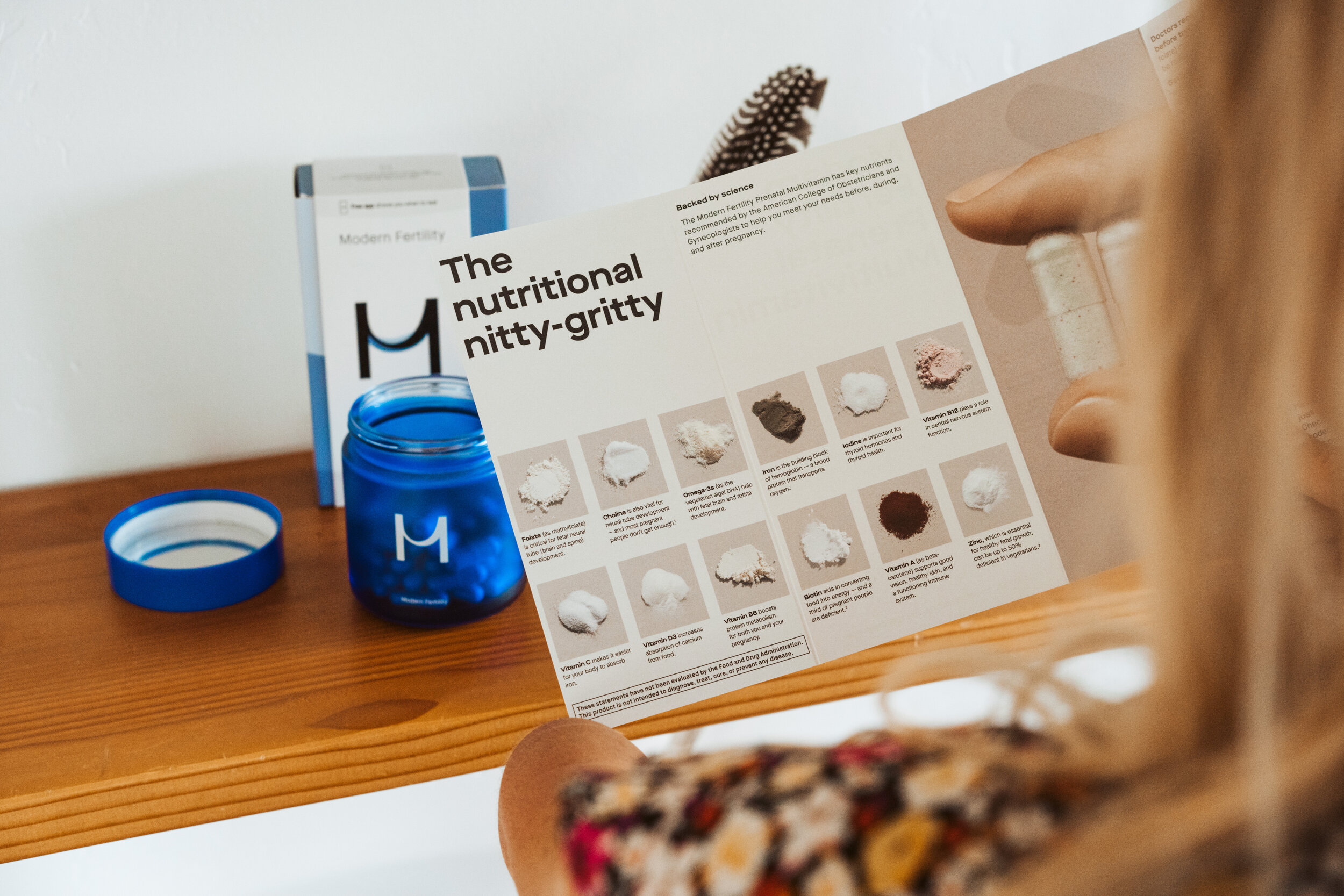
If you’re like me, you’ve been popping prenatals to boost your hair and nail growth long before considering trying to conceive (TTC). Little did I know that there is a very specific function to each vitamin packed into those prenatals, and some additional ones you should be taking even before you begin trying to conceive or start fertility treatment. Understanding these individual vitamins (and more importantly the specific amount you need) are a crucial part of beginning a supplement routine.
Why is a Prenatal So Important?
Prior to conception, we should prep our bodies with proper nutrients in an effort to decrease risk for birth defects and increase our chance for a successful pregnancy and healthy baby. Some women prefer to wait until they are pregnant to focus on their prenatal, but many women start incorporating a prenatal into their routine months prior to pregnancy. Regardless of when you start, prenatals are essential for bridging the nutritional gap between what you’re getting from food and the levels OB-GYNs recommend for before, during, and after pregnancy.
When Should I Take a Prenatal?
Prenatal vitamins are very beneficial taken daily prior to fertility treatment, pregnancy, and preferably 3 months (or more) before conception. If you’re actively trying to conceive, start the prenatal regimen now. This goes for men, too! Folic acid/folate, which you’ve probably heard of at this point, is found in a prenatal, but also is an important nutrient for healthy sperm. All men who are actively trying to conceive will benefit from a basic men’s multi-vitamin containing 100% of the RDA or a specific men’s conception-based formula.
What Are the Key Nutrients I Should Look for in a Prenatal?
Folic acid, folate or methylfolate are all a different form of the same essential B vitamin, that plays a key role in preventing birth defects of the brain and spine, such as spina bifida. The neural tube develops into the baby’s brain and spinal cord within the first 28 days of conception.
A birth defect can occur if the neural tube does not close and this is called a neural tube defect. This critical time period of fetal development is so early in the pregnancy that most women and couples do not know that they are pregnant—another reason to be taking a quality prenatal many weeks or months prior to conception. Folic acid/folate is also necessary for DNA synthesis of red blood cells, nervous system, and proteins; and cellular growth and reproduction.
What is the difference between FOLIC ACID, FOLATE, and METHYLFOLATE?
Folic acid is the synthetic form of vitamin B-9. This synthetic version is found in multi-vitamins, prenatal vitamins, and used to fortify foods such as breakfast cereals, pasta, and breads. Once consumed, folic acid is converted by the body into folate. Folate is a naturally occurring form of vitamin B-9 found in whole foods. Excellent sources of folate include foods such as leafy, dark green vegetables, citrus fruits, lentils and beans, asparagus, peanuts and wheat germ. Methylfolate is a more bioavailable or highly absorbable form of vitamin B-9. This option is very beneficial for anyone who has difficulty absorbing folic acid or needs a clinically high dose for a medical reason.
To learn more about supplements and if you could benefit from a methylfolate supplement, check out my post on Fertility Supplements: Where to Get Started
You should learn more about supplements and what’s right for you by consulting your physician and requesting a blood panel. Many times women are deficient in a particular vitamin and may require an additional dose, and/or they may be unable to metabolize certain vitamins, and in that case may need a different form of the supplement. You can learn more about details like this by reading “It Starts With The Egg.”
Here is a list of all the key nutrients you need to be mindful of when selecting the right prenatal for you. The Prenatal Multivitamin from Modern Fertility is my top choice because it includes all of the essential nutrients listed below. Plus, it’s vegetarian, gluten free and has no preservatives—so it’s easy on the stomach AND it comes in a refillable glass jar so it cuts down on single-use plastics. It’s also FSA/HSA eligible! If you subscribe for $30/month, Modern Fertility will simply send you a refill packet every 30 days, so you never have to think about it.
Whichever route you choose, be sure to find a prenatal that includes these 12 Essential Nutrients.
-
Folate (as methylfolate explained above) is critical for fetal neural tube (brain and spine) development.*
-
Choline is vital for fetal neural tube development — and most pregnant people don’t get enough.*
-
Omega-3s (as the vegetarian algal DHA) help with fetal brain and retina development.*
-
Iron is the building block of hemoglobin — a blood protein that transports oxygen.*
-
Vitamin A (as beta-carotene) supports good vision, healthy skin, and a functioning immune system.*
-
Vitamin B6 boosts protein metabolism for both you and your pregnancy.*
-
Vitamin B12 plays a role in central nervous system function.*
-
Biotin aids in converting food into energy — and a third of pregnant people are deficient.*
-
Vitamin C makes it easier for your body to absorb iron.*
-
Vitamin D3 increases absorption of calcium from food.*
-
Iodine is important for thyroid hormones and thyroid health.*
-
Zinc, which is essential for healthy fetal growth, can be up to 50% deficient in vegetarians.*
Comments +